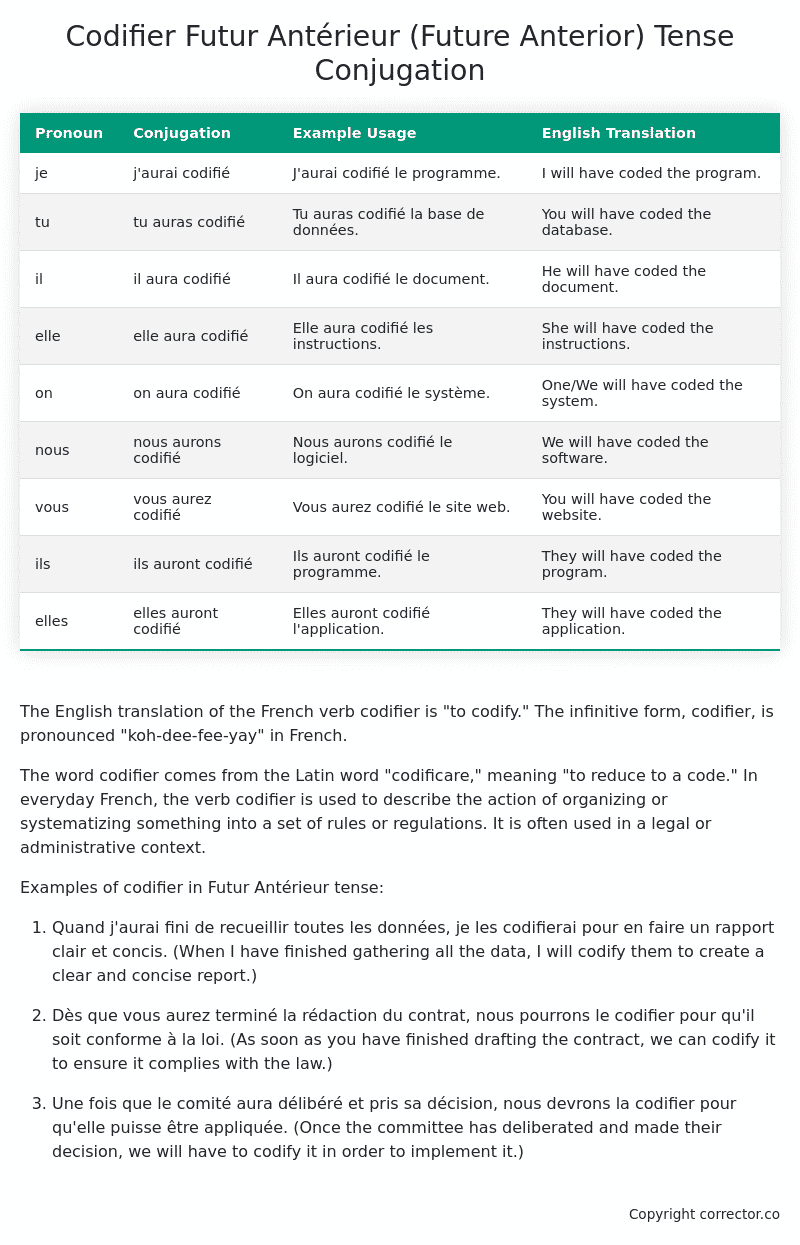Futur Antérieur (Future Anterior) Tense Conjugation of the French Verb codifier
Introduction to the verb codifier
The English translation of the French verb codifier is “to codify.” The infinitive form, codifier, is pronounced “koh-dee-fee-yay” in French.
The word codifier comes from the Latin word “codificare,” meaning “to reduce to a code.” In everyday French, the verb codifier is used to describe the action of organizing or systematizing something into a set of rules or regulations. It is often used in a legal or administrative context.
Examples of codifier in Futur Antérieur tense:
-
Quand j’aurai fini de recueillir toutes les données, je les codifierai pour en faire un rapport clair et concis. (When I have finished gathering all the data, I will codify them to create a clear and concise report.)
-
Dès que vous aurez terminé la rédaction du contrat, nous pourrons le codifier pour qu’il soit conforme à la loi. (As soon as you have finished drafting the contract, we can codify it to ensure it complies with the law.)
-
Une fois que le comité aura délibéré et pris sa décision, nous devrons la codifier pour qu’elle puisse être appliquée. (Once the committee has deliberated and made their decision, we will have to codify it in order to implement it.)
Table of the Futur Antérieur (Future Anterior) Tense Conjugation of codifier
| Pronoun | Conjugation | Example Usage | English Translation |
|---|---|---|---|
| je | j’aurai codifié | J’aurai codifié le programme. | I will have coded the program. |
| tu | tu auras codifié | Tu auras codifié la base de données. | You will have coded the database. |
| il | il aura codifié | Il aura codifié le document. | He will have coded the document. |
| elle | elle aura codifié | Elle aura codifié les instructions. | She will have coded the instructions. |
| on | on aura codifié | On aura codifié le système. | One/We will have coded the system. |
| nous | nous aurons codifié | Nous aurons codifié le logiciel. | We will have coded the software. |
| vous | vous aurez codifié | Vous aurez codifié le site web. | You will have coded the website. |
| ils | ils auront codifié | Ils auront codifié le programme. | They will have coded the program. |
| elles | elles auront codifié | Elles auront codifié l’application. | They will have coded the application. |
Other Conjugations for Codifier.
Le Present (Present Tense) Conjugation of the French Verb codifier
Imparfait (Imperfect) Tense Conjugation of the French Verb codifier
Passé Simple (Simple Past) Tense Conjugation of the French Verb codifier
Passé Composé (Present Perfect) Tense Conjugation of the French Verb codifier
Futur Simple (Simple Future) Tense Conjugation of the French Verb codifier
Futur Proche (Near Future) Tense Conjugation of the French Verb codifier
Plus-que-parfait (Pluperfect) Tense Conjugation of the French Verb codifier
Passé Antérieur (Past Anterior) Tense Conjugation of the French Verb codifier
Futur Antérieur (Future Anterior) Tense Conjugation of the French Verb codifier (this article)
Subjonctif Présent (Subjunctive Present) Tense Conjugation of the French Verb codifier
Subjonctif Passé (Subjunctive Past) Tense Conjugation of the French Verb codifier
Subjonctif Imparfait (Subjunctive Imperfect) Tense Conjugation of the French Verb codifier
Subjonctif Plus-que-parfait (Subjunctive Pluperfect) Tense Conjugation of the French Verb codifier
Conditionnel Présent (Conditional Present) Tense Conjugation of the French Verb codifier
Conditionnel Passé (Conditional Past) Tense Conjugation of the French Verb codifier
L’impératif Présent (Imperative Present) Tense Conjugation of the French Verb codifier
L’infinitif Présent (Infinitive Present) Tense Conjugation of the French Verb codifier
Struggling with French verbs or the language in general? Why not use our free French Grammar Checker – no registration required!
Get a FREE Download Study Sheet of this Conjugation 🔥
Simply right click the image below, click “save image” and get your free reference for the codifier Futur Antérieur tense conjugation!

Codifier – About the French Futur Antérieur (Future Anterior) Tense
Construction
Common Everyday Usage Patterns
Interactions with Other Tenses
For example
Summary
I hope you enjoyed this article on the verb codifier. Still in a learning mood? Check out another TOTALLY random French verb conjugation!


